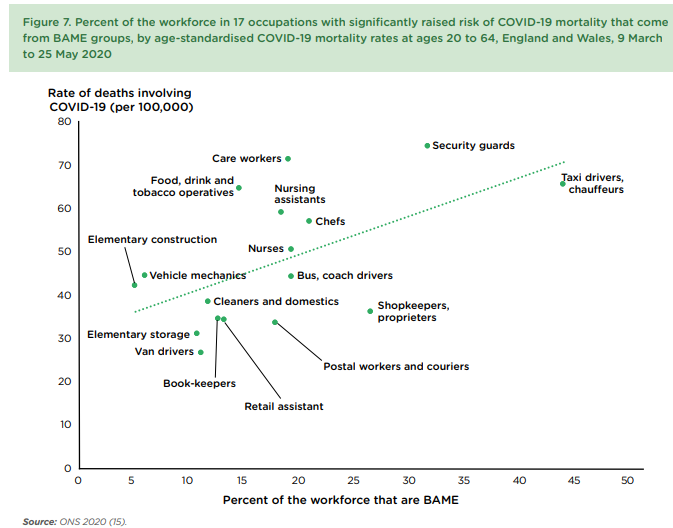
As the UK emerges from the COVID-19 pandemic ‘Build Back Better’ has become the mantra. Important, but we need to Build Back Fairer. The levels of social, environmental and economic inequality in society are damaging health and wellbeing
It was the principles of fairness and the need to do things differently that animated the concrete recommendations we set out in our February 10 Years On Review, just before the pandemic hit with such devastating intensity. Inequalities in mortality from COVID-19 and rising health inequalities as a result of social and economic impacts, have made such action even more important
The aim of this report is three-fold:
- To examine inequalities in COVID-19 mortality. Focus is on inequalities in mortality among members of BAME groups and among certain occupations, alongside continued attention to the socioeconomic gradient in health – the more deprived the area, the worse COVID-19 mortality tends to be
- To show the effects that the pandemic, and the societal response to contain the pandemic, have had on social and economic inequalities, their effects on mental and physical health, and their likely effects on health inequalities in the future
- To make recommendations on what needs to be done
We urge that the Government learns the lessons of the pandemic, prioritises greater equity and health, and works urgently to reduce the severity of the health crisis caused by the economic and social impacts of the pandemic and the societal response.
#BuildBackFairer builds on recommendations in the 10 Years On and Marmot 2010 reports, which were to:
- Give every child the best start in life
- Enable all children, young people and adults to maximise their capabilities and have control over their lives
- Create fair employment and good work for all
- Ensure a healthy standard of living for all
- Create and develop healthy and sustainable places and communities
- Strengthen the role and impact of ill health prevention
Finance Minister Nhlanhla Nene says the panel that has been established to review a list off zero-rated food products will submit its report next month.
The Minister said this when he tabled the Treasury’s Budget Vote at the National Assembly on 22 May 2018.
As part of measures to address a budget shortfall, the National Treasury announced an increase in value-added tax (VAT) from 14% to 15% in February, which took effect in May.
We have established an independent panel of experts to review the list of 19 zero-rated food products and consider how best for government to mitigate the impact of the VAT increase on poor and indigent households.
I have also requested the Panel to consider whether key poverty-alleviating expenditure programmes like the School Nutrition Programme might be better at supporting the vulnerable.
The Panel is expected to submit an initial set of proposals to me by the end of June this year.
Nene said the National Treasury will continue to engage all relevant stakeholders to ensure that the VAT increase will not have an adverse impact on poor and indigent households.

The Minister said, meanwhile, that with tax revenue collections outlook remaining the same, any tax revenue collection agency must, like Caesar’s wife, be above suspicion.
The next major step therefore towards strengthening public finances is to restore public confidence in the SA Revenue Service.
In this regard, President [Cyril] Ramaphosa is finalising the appointment of the Commission of Inquiry into SARS.
During the bus drivers’ strike let’s remember that good transport, or its lack, helps to shape our health. It is one of the social determinants of health. 
The UK The Health Foundation’s new easy-to-read quick guide: “What makes us healthy?explains how your opportunity for health is influenced by factors other than health services and financial support. It helps to explain how, in our unequal society, South Africans don’t have the same opportunity. This is an introduction to the social determinants of health written by Natalie Lovell and Jo Bibby.
“So what causes heart disease? To some, the clear answer would be blocked arteries. But what causes those arteries to become blocked? Perhaps it’s the unhealthy food and drinks people consume, their lack of exercise, or their stress levels. And what, in turn, makes them feel stressed, shapes their opportunities to be active and determines their choices about what they eat and drink?”
“The answers lie in the circumstances in which people are born, grow, live, work, and age: the social determinants of health. These can enable individuals and societies to flourish, or not. These are the causes of the causes.”.





